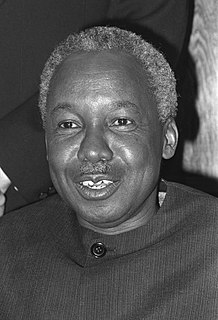A Quote by Julius Nyerere
In Tanganyika we believe that only evil, Godless men would
make the color of a mans skin the criteria for granting him civil
rights.
Related Quotes
Let me go over this again on the reclaiming the civil rights movement. People of faith that believe that you have an equal right to justice - that is the essence. And if it's not the essence, then we've been sold a pack of lies. The essence is everyone deserves a shot - the content of character, not the color of skin.
Through the dark days of legalized segregation and on into the civil rights era, jazz shone as a beacon for achieving interracial respect and understanding. It seemed as if the dream of a color-blind society was within reach in the jazz world, where musicians were judged on merit and not skin color.
There's this big debate that goes on in America about what rights are: Civil rights, human rights, what they are? it's an artificial debate. Because everybody has rights. Everybody has rights - I don't care who you are, what you do, where you come from, how you were born, what your race or creed or color is. You have rights. Everybody's got rights.
For many years now, I have been an outspoken supporter of civil and human rights for gay and lesbian people. Gays and lesbians stood up for civil rights in Montgomery, Selma, in Albany, Ga. and St. Augustine, Fla., and many other campaigns of the Civil Rights Movement. Many of these courageous men and women were fighting for my freedom at a time when they could find few voices for their own, and I salute their contributions.
The Civil Rights Act of 1964 was the most sweeping civil rights legislation of its day, and included women's rights as part of its reforms. Ironically, the section on women's rights was added by a senator from Virginia who opposed the whole thing and was said to be sure that if he stuck something about womens' rights into it, it would never pass. The bill passed anyway, though, much to the chagrin of a certain wiener from Virginia.
































